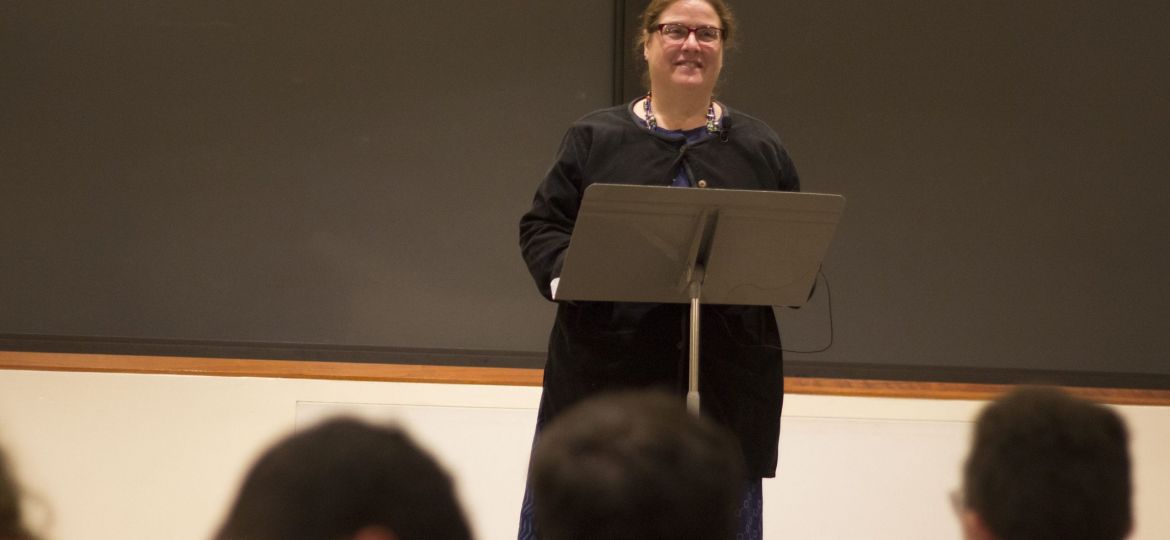
On Monday, Oct. 2 and Tuesday, Oct. 3, writer and translator Sarah Ruden visited Northfield, spending Monday at St. Olaf and Tuesday at Carleton College. The visit was sponsored by the St. Olaf Classics and religion departments, the Great Conversation program, the Boldt Chair of Humanities, the Leraas Fund, the Carleton Classics and English departments, the Distinguished Women Visitors fund and the Global Engagement Initiative.
Ruden earned a Ph.D. in Classical Philology from Harvard University and an M.A. from the Johns Hopkins Writing Seminars. She has published one volume of poetry, translated a number of ancient works such as Aristophanes’ “Lysistrata” and Petronius’ “Satyricon” and written reinterpretations of the Gospel. Her most recent works were both published in 2017: a new translation of Augustine’s “Confessions” and “The Face of Water: A Translator on Beauty and Meaning in the Bible.” Ruden’s current project is a new translation of the Gospels for the Modern Library, which will account for linguistic, literary and historical research absent from most translations.
Ruden’s day at St. Olaf was busy, with all the departments who contributed to her visit taking advantage of her presence. She began the day by delivering a chapel talk, where she extolled the virtues of learning the languages the Bible was written in.
“If the Bible is important to you, don’t take as gospel any pronouncements about it from people like me, from translators who are bound to tell you they’ve got the truth in their back pocket, simply based on their own subjective, individual experience,” Ruden said. “Think seriously, if you possibly have the time, about learning one of the original languages, and then you can see for yourself.”
From the chapel Ruden visited classes in the Greek and religion departments, gave a lecture to the Great Conversation students and was the guest of honor at the Classics conversation table.
“I really appreciated her integration of Classics and theology and her perspective on how we can use classical language to better understand our opinions about the Bible,” Mary Landis Gaston ’19 said.
The main highlight from the day was a lecture Ruden gave in Viking Theater called “From Juvenal to Journalism, and Other Uses for a Liberal Arts Education.” The lecture covered Ruden’s journey from dreams of being a classicist, to working at an investigative newspaper called Noseweek in South Africa, to her current career as a freelance writer and reviewer and how knowledge of classical languages helped her through all of it. She began by discussing her early love for Juvenal, a Roman satirical poet whose work can often be interpreted as bigoted and chauvinistic. Despite his insulting poems, Ruden found the lines gorgeous and aspired to be a poet as well. She gave up these dreams, however, for one reason.
“Great authors deserve obedience as translators, not moral judgments,” Ruden said.
After finding herself in Cape Town, South Africa, just after apartheid, Ruden began her career at Noseweek learning lessons in what people say and why. Upon returning to the United States, she became a reviewer of books about subjects such as sex trafficking, immersing herself in the stories of those who were voiceless. Ruden credited her liberal arts education and her classical background for her ability to say something meaningful about these people.
“The ability to read yielded understanding of human systems, and that is what the liberal arts is supposed to do,” Ruden said. “The liberal arts allowed me not to trail after ancient geniuses but to give a voice to the most deserving human beings.”
Ruden then took questions, advising students about what to do with their liberal arts educations, suggesting ancient authors for the audience to read and commenting that a work is worth reading if it is beautiful, even if it contains objectionable content. The day was full of lessons in the values of translation and the liberal arts for those who attended any of Ruden’s events.
walker1@stolaf.edu

